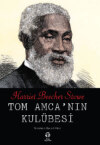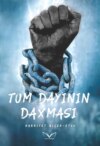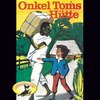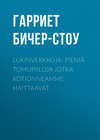Kitabı oku: «Sam Lawson's Oldtown Fireside Stories», sayfa 10
“Wal, the boys see that the doctor’s blood was up, and they rode off pretty quiet; and I believe they never raced no more in that spot.
“But there ain’t no tellin’ the talk this ‘ere thing made. Folks will talk, you know; and there warn’t a house in all Billriky, nor in the south parish nor centre, where it warn’t had over and discussed. There was the deacon, and Ben Bradley was there, to witness and show jest how the thing was, and that the doctor was jest in the way of his duty; but folks said it made a great scandal; that a minister hadn’t no business to hev that kind o’ hoss, and that he’d give the enemy occasion to speak reproachfully. It reely did seem as if Tam’s sins was imputed to the doctor; and folks said he ought to sell Tam right away, and get a sober minister’s hoss.
“But others said it was Cuff that had got Tam into bad ways, and they do say that Cuff had to catch it pretty lively when the doctor come to settle with him. Cuff thought his time had come, sure enough, and was so scairt that he turned blacker’n ever: he got enough to cure him o’ hoss-racin’ for one while. But Cuff got over it arter a while, and so did the doctor. Lordy massy! there ain’t nothin’ lasts forever! Wait long enough, and ‘most every thing blows over. So it turned out about the doctor. There was a rumpus and a fuss, and folks talked and talked, and advised; everybody had their say: but the doctor kep’ right straight on, and kep’ his hoss all the same.
“The ministers, they took it up in the association; but, come to tell the story, it sot ‘em all a-laughin’, so they couldn’t be very hard on the doctor.
“The doctor felt sort o’ streaked at fust when they told the story on him; he didn’t jest like it: but he got used to it, and finally, when he was twitted on’t, he’d sort o’ smile, and say, ‘Anyway, Tam beat ‘em: that’s one comfort.’”
OLDTOWN FIRESIDE TALKS OF THE REVOLUTION
THE sacred work of preparation for Thanksgiving was at hand. Our kitchen was fragrant with the smell of cinnamon, cloves, and allspice which we boys were daily set to pound in the great lignum-vitæ mortar. Daily the great oven flamed without cessation; and the splitting of oven-wood kept us youngsters so busy, that we scarce had a moment to play: yet we did it with a cheerful mind, inspired by the general aroma of coming festivity abroad in the house.
Behold us this evening around the kitchen-fire, which crackled and roared up the wide chimney, brightening with its fluttering radiance the farthest corner of the ample room. A tub of rosy-cheeked apples, another of golden quinces, and a bushel-basket filled with ruby cranberries, stood in the midst of the circle. All hands were busy. Grandmother in one corner was superintending us boys as we peeled and quartered the fruit, – an operation in which grandfather took a helping hand; Aunt Lois was busily looking over and sorting cranberries, when a knock at the door announced a visitor.
“Well, now, I s’pose that’s Sam Lawson, of course,” snapped Aunt Lois.
Aunt Lois generally spoke with a snap; but about Thanksgiving time it had a cheery ring, like the snapping of our brisk kitchen-fire.
“Good-evenin’, Miss Badger and Miss Lois,” said Sam. “I see yer winders so bright, I couldn’t help wantin’ to come in and help ye pare apples, or suthin’.”
We boys made haste to give Sam the warmest welcome, and warmest place in the chimney-corner, and to accommodate him with a tin pan full of quinces, and a knife, when he was soon settled among us.
“Wal, this ‘ere does look cheerful, – looks like Thanksgiving,” he began. “Wal, Lordy massy! we’ve got a great deal to be thankful for in this ‘ere land o’ privileges; hain’t we, deacon? I was a-comin’ ‘round by Mis’ Lothrop’s to-day; and her Dinah, she told me the Doctor was gettin’ a great sermon out on the hundred and twenty-fourth Psalm: ‘If it had not been the Lord who was on our side when men rose up against us, then they had swallowed us up.’ He’s a-goin’ to show all our deliverances in the war. I expect it ‘ll be a whale of a sermon, ‘cause, when our minister sets out to do a thing, he mos’ generally does it up to the handle. Tell ye what, boys, you must listen with all your ears: you ‘ll never know what times them was if you don’t – you don’t know what liberty cost us all. There’s your gran’ther, now, he could tell ye: he ‘members when he went off to Lexington with his gun on his shoulders.”
“Why, grandfather! did you go?” we both exclaimed with wide eyes.
“Well, boys,” said my grandfather, “‘tain’t worth talkin’ about what I did. I was in my mill that day, minding my business, when brother Con, he burst in, and says he, ‘Look here, Bill, the regulars are goin’ up to Concord to destroy our stores, and we must all go. Come, get your gun.’ Well, I said I was a miller, and millers were exempt from duty; but Con wouldn’t let me alone. ‘Get down your gun,’ says he. ‘Suppose we’re going to let them British fellers walk over us?’ says he. Well, Con always had his way of me; and I got my gun, and we started out through the woods over to Concord. We lived at Weston then, ye see. Well, when we got on the brow of the hill, we looked over, and, sure enough, there on burying-ground hill was the British regulars. The hill was all alive with ‘em, marching here and there in their scarlet coats like so many bees out of a hive.
“‘Con,’ says I, ‘jest look there. What are you going to do?’
“‘Shoot some of ‘em, I know,’ says Con.
“And so we ran along, hiding behind trees and bushes and stone walls, till we got near enough to get a shot at ‘em. You see, they broke up into companies, and went here and there about town, looking for the stores; and then, as we got a chance here and there, we marked our men, and popped, and then we’d run, and take aim somewhere else.”
“Wal, now, that are wa’n’t the hull on’t,” said Sam. “Why, there was hundreds of fellers doin’ just the same all round: it was jest pop-pop-pop! from every barn, and every bush, and clump o’ trees, all along the way. Men was picked off all the time; and they couldn’t see who did it, and it made ‘em mad as fury. Why, I ‘member Mis’ Tom Bigelow, she that was Sary Jones, told me how they sot her mother’s house afire and burnt it down, ‘cause their nigger man Cæsar popped at ‘em out o’ the buttery window. They didn’t tell him to; but Cæsar, he was full of fight, like all the rest on ‘em. Lordy massy! the niggers went for suthin’ in them times! Their blood was up as quick as anybody’s. Why, there was old Pompey Lovejoy lived over by Pomp’s pond in Andover, he hitched up his wagon, and driv over with two barrels o’ cider and some tin dippers, and was round all day givin’ drinks o’ cider to our men when they got het and thirsty and tired. It was a pretty warm day for April, that was. Pomp has told me the story many a time. ‘Twas all the cider he had; but cider goes for suthin’, as well as gunpowder in its place, and Pomp’s cider come jest right that day.”
“But grandfather,” said I, “what happened to you over there?”
“Well, you see,” said grandfather placidly, “I wasn’t killed; but I come pretty nigh it. You see, they sent into Boston for re-enforcements; and, by the time we got to Lexington, Earl Percy was marching out with fresh troops and cannon. Con and I were standing on the meetin’-house steps, when there come a terrible bang, and something struck right over our heads, and went into the meetin’-house. ‘Why, Bill!’ says Con, ‘what’s that?’ – ‘They’ve got cannon: that’s what that is,’ says I. ‘Let’s run ‘round the other side.’ So we did; but just as we got round there, there come another bang, and a ball crashed right through the meetin’-house, and come out of the pulpit window. Well, we saw there was no staying there: so we run then, and got into a little clump of trees behind a stone wall; and there we saw ‘em go by, – Earl Percy on his horse, and all his troops, ever so grand. He went on up to Concord. Fact is, if it hadn’t been for him and his men, those regulars would all have been cut off: they wouldn’t one of ‘em have got back, for the whole country was up and fighting. The militia came pouring in from Weston and Acton and Billriky, – all the towns round. Then their Col. Smith was wounded, and a good many others, and lots of ‘em killed, and our minute-men coming on ‘em before and behind, and all around. But ye see, we couldn’t stand regular troops and cannon; and so, when they come on, we had to give back. Earl Percy came up, and formed a hollow square, and they marched into it, and so gave ‘em time to rest.”
“Wal, there was need enough on’t,” said Sam. “The regulars had been hectored and picked, and driv ‘round so from piller to post, that they was dog tired. Jimmy Irwin, he was a little chap then; but he telled me how he see the men jest threw ‘emselves down on the ground, their tongues trailing out o’ their mouths like hunting-dogs. You see, they had about two hundred wounded, and twenty eight or nine was taken prisoners, and sixty-four killed outright: so Lord Percy had his hands full o’ takin’ care o’ the mess they’d got up.”
“Yes,” said my grandfather, “there were dead men lying all around the road as we came back. There, boys!” he said, pointing to a gun and powder-horn over the chimney, “we picked up these when we were coming home. We found them on a poor fellow who lay there dead in the road: there’s some blood of his on it to this day. We couldn’t help feeling it was most too bad too.”
“Poor fellow! he wa’n’t to blame,” said my grand-mother. “Soldiers have to go as they’re bid. War’s an awful thing.”
“Then they shouldn’t have begun it,” interposed Aunt Lois. “‘They that take the sword shall perish by the sword.’”
“Well, grandpapa,” said I, “what were the stores they went up to get?”
“They were stores laid up to enable us to go to war, and they were ‘round in different places. There were two twenty-four-pounders that they spiked, and they threw about five hundred pounds of ball into the river or wells, and broke up sixty barrels of flour, and scattered it about.”
“Wal,” said Sam triumphantly, “there was one lot they didn’t get. Cap’n Tim Wheeler had about the biggest lot o’ wheat, and rye-flour, and corn-meal stored up in his barn, with some barrels of his own. So when this ‘ere fine jay-bird of an officer came to him all so grand, and told him to open his barn and let him look in, the cap’n, he took his key, and walked right out, and opened the barndoor; and the officer was tickled to pieces. He thought he’d got such a haul!
“‘If you please, sir,’ says the cap’n, ‘I’m a miller, and got my living by grinding grain. I’m a poor man. You can see my mill out there. I grind up a lot o’ grain in the winter, and get it ready to sell in the spring. Some’s wheat, and some’s rye, and some’s corn-meal; and this wheat is mine, and this rye is mine, and this corn-meal is mine;’ and, when he spoke, he put his hand on his own barrels.
“‘Oh! if this is your private property,’ says the officer, ‘we sha’n’t touch that: we don’t meddle with private property.’ And so he turned on his heel, and the cap’n, he locked up his barn.”
“Was that telling the truth?” said I.
“Wal, you see it was true what he said,” said Sam. “Them bar’ls he laid his hands on was hisn.”
“But Aunt Lois told me yesterday it was as bad to act a lie as to speak one,” said I.
“Well, so I did,” said Aunt Lois. “The truth is the truth, and I ‘ll stick to it.”
“But, Aunt Lois, would you have told him, and let him break up all those barrels?”
“No, I shouldn’t,” said Aunt Lois. “I should have done just as Cap’n Tim did; but I should have done wrong. Right is right, and wrong is wrong, even if I can’t come up to it always.”
“What would you have done, grandfather?” said I.
My grandfather’s mild face slowly irradiated, as when moonbeams pass over a rock.
“Well, boys,” he said, “I don’t think I should have let him break up those barrels. If it was wrong to do as Cap’n Wheeler did, I think most likely I should ‘a’ done it. I don’t suppose I’m any better than he was.”
“Well, at any rate,” said Aunt Lois, “what folks’ do in war time is no rule for ordinary times: every thing is upset then. There ain’t any of the things they do in war time that are according to gospel teaching; but, if you boys were to do just as Cap’n Wheeler did, I should say you lied by speaking the truth.”
“Well, well,” said my grandmother, “those were dreadful times. Thank the Lord that they are past and gone, and we don’t have such awful cases of conscience as we did then. I never could quite see how we did right to resist the king at all.”
“Why, the Bible says, ‘Resist the devil,’” said Aunt Lois.
A general laugh followed this sally.
“I always heard,” said my grandfather, by way of changing the subject, “that they meant to have taken Mr. Adams and Mr. Hancock and hung ‘em.”
“Wal, to be sure they did,” said Sam Lawson. “I know all about that are. Sapphira Clark, up to Lexington, she told me all about that are, one day when I was to her house puttin’ down her best parlor carpet. Sapphira wa’n’t but ten or eleven years old when the war broke out; but she remembered all about it. Ye see, Mr. Hancock and Mr. Adams was a-staying hid up at their house. Her father, Mr. Jonas Clark, was minister of Lexington; and he kep’ ‘em quite private, and didn’t let nobody know they was there. Wal, Sapphira said they was all a-settin’ at supper, when her father, he heard a great rapping at the front-door; and her father got up and went and opened it; and she looked after him into the entry, and could just see a man in a scarlet uniform standing at the door, and she heard him ask, ‘Are Sam Adams and John Hancock here?’ And her father answered, ‘Oh, hush! Don’t mention those names here.’ – ‘Then,’ says the man, ‘I come to tell you the British troops will be along by sunrise; and, if they are in your house, they’d better escape right away.’”
“That must have been Col. Paul Revere,” said Aunt Lois. “He went all through the country, from Boston to Concord, rousing up people, and telling ‘em to be ready.”
“Well, what did Mr. Adams and Hancock do?”
“Wal, they got ready right away, and slipped quietly out the back-door, and made their way over to Burlington, and staid in the minister’s house over there out of the way of the battle.”
“What would the British have done with ‘em, if they had caught them?” said I.
“Hung ‘em – high as Haman,” said my Aunt Lois sententiously. “That’s what they’d have done. That’s what they’d ‘a’ done to them, and to Gen. Washington, and lots more, if they’d had their way.”
“Oh, yes!” said grandfather, “they were mighty high-stepping at first. They thought they had only to come over and show themselves, and they could walk through the land, and hang and burn and slay just whom they’d a mind to.”
“Wal, they found ‘twas like jumping into a hornets’ nest,” said Sam Lawson. “They found that out at Lexington and Bunker Hill.”
“Brother Con was in those trenches at Bunker Hill,” said grandfather. “There they dug away at the breastworks, with the bom’-shells firing round ‘em. They didn’t mind them more than if they’d been hickory-nuts. They kep’ fellows ready to pour water on ‘em as they fell.”
“Well, I never want to feel again as I did that day,” said grandmother. “I was in Boston, visiting cousin Jemima Russel, and we were all out on the roof of the house. The roofs everywhere were all alive with people looking through spy-glasses; and we could hear the firing, but couldn’t tell how the day was going. And then they set Charlestown on fire; and the blaze and smoke and flame rose up, and there was such a snapping and crackling, and we could hear roofs and timbers falling, and see people running this way and that with their children – women scared half to death a-flying; and we knew all the time there was cousin Jane Wilkinson in that town sick in bed, with a baby only a few days old. It’s a wonder how Jane ever lived through it; but they did get her through alive, and her baby too. That burning Charlestown settled to fight it through: it was so mean and cruel needless.”
“Yes,” said my grandfather, “that day settled the question that we would be free and independent, or die; and, though our men had to retreat, yet it was as good as a defeat to the British. They lost ten hundred and fifty-four in point with a good many. They determined then killed and wounded, and we only four hundred and fifty-three; and our men learned that they could fight as well as the British. Congress went right to work to raise an army, and appointed Gen. Washington commander. Your gran’ther Stowe, boys, was orderly of the day when Gen. Washington took the command at Cambridge.”
“Wal,” said Sam, “I was in Cambridge that day and saw it all. Ye see, the army was drawn up under the big elm there; and Ike Newel and I, we clim up into a tree, and got a place where we could look down and see. I wa’n’t but ten year old then; but, if ever a mortal man looked like the angel of the Lord, the gineral looked like it that day.”
“Some said that there was trouble about having Gen. Ward give up the command to a Southern man,” said my grandfather. “Gen. Ward was a brave man and very popular; but everybody was satisfied when they came to know Gen. Washington.”
“There couldn’t no minister have seemed more godly than he did that day,” said Sam. “He read out of the hymn-book the hundred and first Psalm.”
“What is that psalm?” said I.
“Laws, boys! I know it by heart,” said Sam, “I was so impressed hearin’ on him read it. I can say it to you: —
‘“Mercy and judgment are my song,
And since they both to thee belong,
My gracious God, my righteous King,
To thee my songs and vows I bring.
If I am raised to bear the sword,
I ‘ll take my counsels from thy word.
Thy justice and thy heavenly grace
Shall be the pattern of my ways.
I ‘ll search the land, and raise the just
To posts of honor, wealth, and trust:
The men who work thy righteous will
Shall be my friends and favorites still.
The impious crew, the factious band,
Shall hold their peace, or quit the land;
And all who break the public rest,
Where I have power, shall be suppressed.’”
“And he did it too,” remarked Aunt Lois.
“He trusted in the Lord, and the Lord brought him to honor,” said my grandmother. “When he took the army, every thing was agin’ us: it didn’t seem possible we should succeed.”
“Wal, he was awful put to it sometimes,” said Sam Lawson. “I ‘member Uncle David Morse was a-tellin’ me ‘bout that are time down in New York when the’ Massachusetts and Connecticut boys all broke and run.”
“Massachusetts boys run? How came that Sam?” said I.
“Wal, you see, sometimes fellows will get a-runnin’; and it jest goes from one to another like fire, and ye can’t stop it. It was after the battle of Long Island, when our men had been fighting day after day, and had to retreat. A good many were wounded, and a good many of ‘em were sick and half-sick; and they’d got sort o’ tired and discouraged.
“Well, Lord Howe and the British came to make a landing at Kipp’s Bay round by New York; and the troops set to guard the landing began to run, and the Massachusetts and Connecticut men were sent to help ‘em. Uncle David says that the fellows that run spread the panic among ‘em; and they looked ahead, and saw an ox-drag on top of a hill they was to pass, and they thought ‘twas a cannon pintin’ right at ‘em; and the boys, they jest broke and run, – cut right across the road, and cleared over the fence, and streaked it off cross-lots and up hill like a flock o’ sheep. Uncle David, he run too; but he’d been sick o’ dysentary, and was so weak he couldn’t climb the fence: so he stopped and looked back, and saw Gineral Washington cantering up behind ‘em, shouting, and waving his sword, looking like a flamin’ fire. Oh, he was thunderin’ mad, the gineral was! And, when he see the fellows skittering off cross-lots, he jest slammed his hat down on the ground, and give up. ‘Great heavens!’ says he, ‘are these the men I’ve got to fight this battle with?’
“Wal, Uncle David, he picked up the gineral’s hat, and come up and made his bow, and said, ‘Gineral, here’s your hat.’
“‘Thank you, sir!’ said the gineral. ‘I’m glad to see one brave fellow that can stand his ground. You didn’t run.’
“Uncle David said he felt pretty cheap, ‘cause he know’d in his own heart that he would ‘a’ run, only he was too weak to git over the fence; but he didn’t tell the gineral that, I bet He put the compliment in his pocket, and said nothing; for now the gineral’s aides came riding up full drive, and told him they must be off out of the field in a minute, or the British would have ‘em, and so one on ‘em took Uncle David up behind him, and away they cantered. It was a pretty close shave too: the British was only a few rods behind ‘em.
“Oh, dear, if they had caught him!” said I. “Only think!”
“Well, they would have hung him; but we should have had another in his place,” said Aunt Lois. “The war wouldn’t ‘a’ stopped.”
“Well, ‘twas to be as ‘twas,” said my grandmother. “The Lord had respect to the prayers of our fathers, and he’d decreed that America should be free.”
“Yes,” said Sam: “Parson Badger said in one o’ his sermons, that men always was safe when they was goin’ in the line o’ God’s decrees: I guess that are was about it. But, massy! is that are the nine o’clock bell? I must make haste home, or I dun’ know what Hetty ‘ll say to me.”










